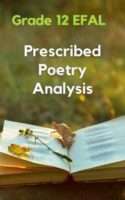Here is a link to the poem Everything has changed (except graves) by Mzi Mahola.
Mzi Mahola is a South African poet who was born and spent his early years in Lushington, near Alice, in the Eastern Cape. It’s useful to know this background information because this poem is about a time when he goes back to the place he grew up in and notices the changes there.He writes a quietly thoughtful free verse poem about his memories of the past in the town.
Mahola starts the poem with an abrupt observation, ‘I stood at the ruins/of my former school’. These two lines immediately place the audience in the context of his visit. His former school is now in ruins. Time has taken its toll. In this school, he was ‘patiently moulded’. It was here that people tried to change him to fit into what society felt was acceptable – though it was done patiently, which seems to suggest that he has some fond memories of the teachers who did the moulding. ‘Wild plants own every space now’ – so it is no longer a place of learning, but of wild things. It is hard for Mahola to see his school so ruined, and he says his soul is ‘paralyzed’.
Mahola wonders what happened to ‘the roofs / the doors and windows?”. These constructs of the building where elements that held him inside waiting, as he looked out the window, for the moment he was free to race through the door to the outside world. He then asks a more soul-searching question, ‘Can these dumb lonely walls / still recognise me?’ He personifies the walls as if they can empathise with him.
The line ‘Everything has changed;’ gives the reader a chance to move back into the present where everything about the place, and no-doubt himself, has changed. He remembers a particularly shameful moment of his past when he ‘pummelled a schoolmate almost to pulp’ in the ‘corner of the playground’. The poet uses alliteration in these lines to repeat the ‘p’ sound which reinforces the harsh sounds of the blows of the beating.
This area is now ‘scarfed with wattle’. In this metaphor, the wattle – a type of tree – is compared to a scarf that someone might wind around their neck, perhaps even in strangling manner. The area where he behaved so badly is now strangled in wattle – hiding how ashamed he is of his youthful behaviour.
The poet now moves away from the school to a ‘renovated Church’. The capital ‘C’ for church shows how important this building and religion was/is to the town. It hasn’t fallen into ruins like the school, but it has been renovated – changed and updated. Extra information is provided in the brackets, ‘(a Dutch Reformed formerly, / now Methodist)’. This, in part, explains the renovation – and again reminds us of change. The denomination of the church has moved away from the Afrikaans churches that dominated the rural landscape in the past to a Methodist church.
The ‘mute little cemetery’ is personified as mute (silent) and it seems to embrace the church. It certainly surrounds the church in the silence of those who have died in the past. The poet offers some extra information in brackets, ‘(the dividing fence has vanished)’. The fence that divided the graveyard from the surroundings has disappeared. Is this also an allusion to the divides of apartheid having been removed? That the fence that made this a whites-only space are now gone? (It’s important to remember that poetry is not ‘science’, and that as readers we sometimes interpret things differently from what the poet may have intended…)
The cemetery, like the schoolyard, is also now covered in vegetation, ‘though growth strangles it to near extinction;’. Again, the reader is confronted with this idea of the past being steadily strangled, and perhaps of growth – and change – being negative as well as positive.
The poet goes onto confront the past more directly when he reflects on the ‘cold names of the departed whites’. Of course, the names of the white people who have died are inscribed on the ‘headstones’ but the poet may also be commenting on the white people who were ‘cold’ in the way they treated black people. After the end of apartheid many of them left the community to which they had made ‘monumental contributions’. Notice the alliteration of the ‘c’ letters in these lines. This hard sound could reflect the cutting and cold nature of the white people who lived in the town. ‘Monumental’ means enormous. Perhaps, just as headstones in the cemetery are large, so was the negative impact that apartheid had on the black people in the town. The only reason ‘whites come here’ is ‘to clean and put flower/on their family graves’.
Mahola writes that ‘a voice whispers next to me’. But unlike in the old days, he is not familiar with locals, and the person is a stranger in this place where so much has changed.


